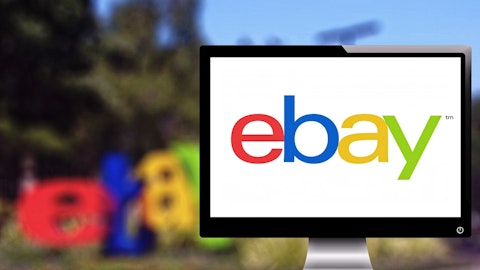We had a bunch of clients that have come back to us and said, “Hey, I can use this money. And on average, it’s $180,000 per client. So we’ve been doing that. We created partnerships with fintechs during the PPP during the pandemic, and we’re also helping our clients from that perspective as well because we’ve really become a trusted source for our clients to help them when they’re trying to figure out how to take advantage of tax programs of government programs. When you look at the PPP loans, 9% of all of the PPP loans in the U.S. was placed by Paychex. That was more than JPMorgan and Bank of America, you guys combined. And so I think we’re continuing to support them and help them, and we’ll continue to look for ways that we can help them access non-traditional funding sources.
And I think that’s another part of our value proposition that our customers and our CPA partners are appreciating.
Jason Kupferberg: Okay. Understood. As a follow-up, I just wanted to ask on the float side of things, maybe a two-parter there. the first part just being, obviously, the unrealized losses have increased with the rates going up, but just wanted to confirm, you guys can comfortably meet all the float obligations just short-term component? I know you said so far to date, obviously, that’s been the case. But I just wanted to make sure we shouldn’t expect any material amount of realized losses? And then just any thoughts on Fed — now coming this summer, do you see any potential impacts on float if it’s adopted by enough banks? And maybe just talk about how your float income breaks down between payroll and tax pieces.
Efrain Rivera: Yes. Let me take the first part. Yes, Jason, obviously, one, as John mentioned earlier in the call, when you have interest rates rising 450 basis points at the pace it did and you’re holding very high-quality securities, but our interest rates at 1.5%, you’re going to take going to take — you’re going to see some of the unrealized losses that you see in the portfolio. We hold our securities to maturity. So that really doesn’t represent an issue. We’ve had swings from plus $100 million plus now obviously to this point, had nothing to do with credit. So, there’s really no issues there. Understand why you ask and understand all of the all of the concerns that others had. So, those securities will roll the portfolio as they mature, just to remind people on the call, our average duration is around 3.5 years or so.
So this is relatively quick. So no issues there. High quality, we really only typically in A or above and no concerns there. The second part of your question, I didn’t catch. I was focusing too much on the first part, Jason.
Jason Kupferberg: Yes, sorry, I was just asking about Fed now with those real-time rails coming out this summer. Just any thoughts on how that could, if it all impact float balances, float income obviously like we’ll see how many banks adopt it, right, but — and then anything just on your float income, how it breaks down between the payroll and the tax pieces? Because I know, obviously, some of the float you hold a lot longer. So…
Efrain Rivera: Yes. Yes. Good question. So yes, we’ve been anticipating that at some point, what the current landscape of payments, certainly ACH windows, which provides some measure of the float that we have is one to narrow. But you, of course, you know business very well. A lot of our float income is not coming necessarily from overnight payroll, is coming from taxes and that should not be impacted significantly under the Fed rules. The other part that I would say flip around there is that we stopped and there’s not been a lot of conversations really as much lately about real-time payments. We do think that there will be opportunities in the future and that may be an opportunity to monetize even if you lose some element of the float income.





